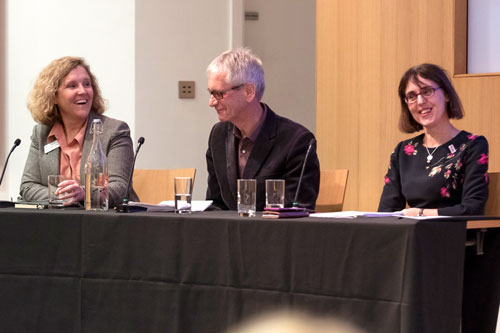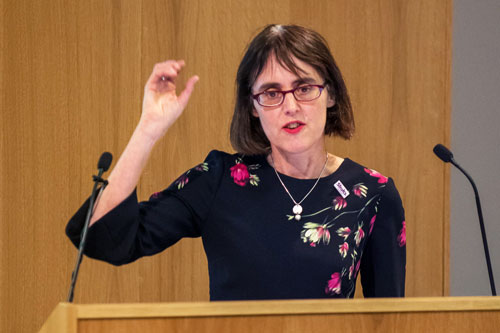Managing and leading inside the non-profit sector
Juliet Bouverie, Chief Executive of the Stroke Association speaks at Cass.
 Cass and the Centre for Charity Effectiveness (CCE) were pleased to welcome Juliet Bouverie, Chief Executive of the Stroke Association to speak at Charity Talks.
Cass and the Centre for Charity Effectiveness (CCE) were pleased to welcome Juliet Bouverie, Chief Executive of the Stroke Association to speak at Charity Talks.
Juliet was joined by our Dean, Professor Marianne Lewis. The talk was chaired by Professor Ian Bruce CBE, President of Cass CCE.
Her topic on ‘Managing and leading inside non-profits’ gave all who attended great insights into Juliet’s career as a leader in the charity sector. She regaled the audience with stories from her own leadership journey, highlighting some of the difficulties managers encounter when they transition into leaders. She also spoke about the importance of ‘human’ leadership and that hierarchical, ‘top-down’ strategies do not work.
Throughout my career, I’ve learnt the value of BHAGs (Big Hairy Audacious Goals)… if we don’t set them, and inspire action behind them, we don’t achieve transformational change.
Juliet Bouverie, Chief Executive, Stroke Association
Having a dream, not a plan
“One of the biggest privileges as a chief executive is to be able to dream, and dream big,” said Juliet. “But it’s also to influence that dream to come true. It’s particularly fun in the voluntary sector because our job is to deliver social impact and we can do so outside of the constraints of the system – in other words, we can be non-conformist.”
Speaking about paradoxes of leadership, Juliet’s recommendation was to foster agile, organisational cultures and to learn and adapt at pace. She added, “At the Stroke Association, our change is underpinned by an approach which is about ‘test and learn’ but is balanced by robust governance arrangements, which limit our risks.”
The uncertainty space
Before Juliet became a chief executive, she was told that her biggest career transition would be from functional director to CEO. The challenge of managing multiple stakeholders, being accountable to trustees would be a huge and challenging jump.
However, that was not her experience. She reflected, “My roles have been big and complex. At Macmillan I managed 800 people within an intricate business model focused on innovation as well as getting partners, like the NHS, to own our solutions.”
Actually, her biggest – and most challenging transition – was from manager to leader. As a head of function, her teams grew in size at every promotion, but she discovered it wasn’t about the size of the teams:
“I quickly realised I wasn’t in control. I was working in the uncertainty space that leaders inhabit and I learned that I needed to do two things. One was to trust and empower others by distributing leadership - command and control style leadership doesn’t work. Secondly, was to feel comfortable with ambiguity – holding more than two truths at any one time and not being binary. It’s not going for ‘either-or’ solutions but choosing ‘both-and’."
 About Juliet Bouverie
About Juliet Bouverie
Juliet joined the Stroke Association in 2016. Prior to this, she worked at Macmillan Cancer Support for 16 years in roles including head of planning and policy, director of corporate development and executive director of services and influencing. In her last role at Macmillan Cancer Support, she secured important government commitments to improve patient experience and post-treatment support through the 2015 Cancer Strategy for England.
Prior to Macmillan, Juliet worked at the British Red Cross in strategy and service evaluation, the Community Development Foundation in fundraising and a political consultancy. She was a trustee of the Long-Term Conditions Alliance and chaired the Cancer Patient Experience Board for University College London Hospital (UCLH) from 2011 to 2014.
